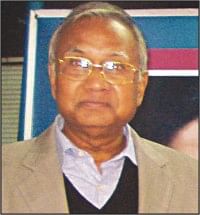Bazlur Rahman, a good journalist

Bazlur Rahman was an enlightened man of our times. It was enlightenment that he brought into the profession of journalism. But his life came to a sudden, quick end. Throughout his life, Rahman epitomised the sense of aesthetics. If he had not died young, and sixty-seven years is being relatively young when one observes the large canvas on which men like Bazlur Rahman work, he would definitively have further enriched the world of Bangladesh's media. Despite all that, however, in more than six decades that he lived, Rahman surely made a difference.
And he was able to do that by holding on to the idea that journalism was a vocation based on principles. As editor of the well-known Bengali daily Sangbad, he made it his consistent goal to keep himself focused on the necessity of truth being carried into hearts and homes on the strength of objectivity. There was a liberal dose of decency in him, the vast scale of which came to be reflected in the gentle yet determined manner in which he carried on his interaction with others. Like any morally driven, committed journalist, Bazlur Rahman made it a point to listen to the opinions of others before he would come up with his own views on the social and political issues that stirred minds in Bangladesh. And, as a person believing fully in secular democracy, he was careful never to force his opinions on others around him. That was surely why he was always respected by his colleagues and by all those he came in touch with.
Bazlur Rahman was all his life a committed political being; and his politics solidified the world of his journalism. In his youth, he dabbled in communism, before moving on to the socialist ideals espoused by the Muzaffar branch of the National Awami Party. He then moved on, soberly and quietly, to the thought that politics works best when it prepares men and women to live in healthy accommodation with the rest of the world.
In the death of Bazlur Rahman, we have lost a big part of ourselves. But we will remember him, and by doing so we may yet build on the professional richness that his journalism has left for us to emulate.

 For all latest news, follow The Daily Star's Google News channel.
For all latest news, follow The Daily Star's Google News channel. 



Comments